- Home
- Roger Zelazny
Doorways in the Sand Page 16
Doorways in the Sand Read online
Page 16
Ragma sighed and turned my way again.
“He does not do it to alienate his patients,” he said. “He does it to help them. I guess that it is asking too much to expect you to appreciate the centuries of subtle philosophizing his people have devoted to this sort of thing.”
“Yes,” I replied.
“The theory is that any primary emotion can be used as a mnemomolecular key. Its skilled induction provides a telepath of his species with access to all of an individual’s life experiences with resonance in that area. Now, it has been found that fear is a significant component of the problems most of his patients bring to him. Therefore, by inducing a flight response and frustrating it, he is able to sustain the emotion and keep the patient within range of therapy simultaneously. That way, he can review the emotive field in a single session.”
“Does he eat his mistakes?” I asked.
“He has no control over his ancestry,” Ragma replied. “Do you brachiate?” Then: “Never mind,” he said. “You do. I forgot.”
I turned to Nadler, who had just approached, and Paul, who was standing nearby, smirking.
“I take it all this sounds proper to you,” I said, addressing them both.
Paul shrugged and Nadler said, “If it gets the job done.”
I sighed.
“I suppose you are right,” I said. Then: “Paul, what are you doing here?”
“Fellow employee,” he replied. “I was recruited around the same time as yourself. By the way, I am sorry about that day back at your place. It was a matter of life and death, you know. Mine.”
“Forget it,” I said. “In what capacity have they got you on the payroll?”
“He is our expert on the stone,” Nadler said. “He knows more about it than any other man alive.”
“You’ve given up on the crown jewels, then?” I asked.
Paul winced. He nodded.
“You know, then,” he said. “Yes, it was a belated youthful geste that got out of hand. Mea culpa. We had not anticipated the involvement of criminals to this extent. After I recovered from their abuse, I realized the mistake we had made and set out to put things right. I told the UN people everything I knew. Had a hard time convincing them but finally did. They were decent enough not to have me locked away somewhere. Even filled me in a bit concerning your difficulties down home. But making a clean breast of it was still not enough for me. I wanted to help recover the thing. You had just returned to the States, and I figured that they would try for you again. So I decided to keep an eye on you till they did, then spike their guns on the spot. I got onto your trail at Hal’s and followed you as far as the Village, but I lost you in a bar there. Didn’t catch up with you again till you were back home. You know the rest.”
“Yes. Another small mystery resolved. Then you were hired in the hospital, too?”
“Correct. Ted here said that if I was that concerned about the way things were going, I might as well save some wasted motion and get paid for it, too. On the books, though, I am an XT-mineralogist.”
“It seems to me,” I said, addressing all of them, “That my being brought here tonight represents more than the mere avoidance of a couple of thugs. I would guess that you have something else in mind, only just beginning with the telepathic probe.”
“Nor would you be incorrect,” said Ragma. “However, since it is all contingent on the results of the analysis, it would be an exercise in redundancy to detail the various hypotheses which may have to be discarded.”
“In other words, you are not going to tell me?”
“That pretty well sums it up.”
Before I could submit my resignation or comment on any of a number of likely subjects that had occurred to me, I was distracted by a movement from across the room. Doctor M’mrm’mlrr was stirring again.
We all watched as he raised his snaky appendages and began his setting-up exercises. Stretch, relax . . . Stretch, relax . . .
Two or three minutes of this—it was kind of hypnotic—and I realized that he was stalking me again, only with a much greater delicacy than he had previously employed.
I felt the touch again, within my head, as an unnatural stirring beneath my basal thoughts. Only this time there was no accompanying pain. It was just a sort of dizzy feeling and a sense of process not unlike the awareness of something being done under a local anesthetic. I guess that the others had somehow been made aware of this also, for they maintained their positions and their silence.
All right. If M’mrm’mlrr was going to be a little more civilized about it, he could have my cooperation, I decided.
So I sat there and let him rummage about.
Then, quite abruptly, he must have come across the big switchboard somewhere down there and pulled a plug, because I blacked out, instantly and without pain. Blink.
Blink again.
Weary, thirsty and with a feeling of having been broken down and reconstituted incorrectly, I raised my hand to rub my eyes and glimpsed the face of my watch as I did so. Then I swung it up and listened for ticks. As I already suspected, it was still tossing them off. Ergo . . .
“Yes, about three hours,” said Ragma.
I heard Paul snore, snort short, cough and sigh. He had been dozing in the armchair. Ragma was sprawled on the floor, smoking. M’mrm’mlrr was still upright and stirring. Nadler was nowhere in sight.
I stretched, unkinking muscle after muscle, hearing my frame creak like a floor that has been walked on overmuch.
“Well, I hope that you learned something useful,” I said.
“Yes, I would say that we have,” Ragma replied. “How do you feel?”
“Wrung out.”
“Understandable. Yes. Very. You were something of a battleground for a while there.”
“Tell me about it.”
“To begin with,” he said, “we have located the star-stone.”
“Then you were right? Everyone was? I had the knowledge—somewhere?”
“Yes. The memory should even be accessible now. Want to try for it yourself? A party. A broken glass. The desk . . .”
“Wait a minute. Let me think.”
I thought. And it was there. The last time that I had seen the star-stone . . .
It was the bachelor party I had given for Hal the week before his wedding. The apartment was crowded with our friends, the booze flowed, we made a lot of noise. It went on till around two or three in the morning. All in all I would have to say that it was an effective party. At least, it seemed that everyone went home laughing and there were no injuries.
Except for one small accident of my own.
Yes. A glass was elbowed off a side table, shattered. It was empty, though. Nothing to mop up. And it was right near the end of things. People were saying good night, leaving. So I left the pieces where they had fallen. Later. Mañana maybe.
Still, I knew that I had had too much to drink, could guess how I would feel the next morning and what I would doubtless do.
I would growl and curse and bid the day depart. When it persisted, I would roll out of bed, stagger off to the kitchen to put the coffee on—my first act on any day—then lumber back to the bathroom for standard maintenance while it brewed. Invariably barefoot. Certainly not remembering that my path was strewn with shards. At least for a brief while I would not remember. So I fetched the wastebasket from beneath the desk, got down into a hunker and began policing the area.
Naturally, I cut myself. I leaned too far forward at one point, lost my balance, extended a hand to maintain it and located another shard as my palm struck the floor.
I began bleeding, but I wrapped my handkerchief around it and continued with the cleanup. I knew that if I stopped right then to take care of my hand I would be tempted to let things go afterward. I was very sleepy.
So I got up all the pieces that I could see and wiped over the area with damp cocktail napkins. That done, I returned the wastebasket to its usual spot and dropped back into the desk chair because it was right there an
d I wanted to.
I unwrapped my hand and it was still bleeding. No sense doing anything at all until my thrombin earned its keep. So I leaned back and waited. My eyes did rest for a moment on the model of the star-stone we used for a paperweight. In fact, I reached out and turned it slowly, deriving a certain semisober satisfaction from the shifting light patterns it displayed. Then I stretched out my arm full length on the blotter because my head was heavy and it occurred to me that my biceps would do nicely for a pillow. Resting that way, eyes still open, I continued to play with the stone, feeling a small regret at having gotten blood on it, then deciding that it was all right, as it made for amusing contrasts here and there. Goodbye, world.
It was a couple of hours later that I awoke, thirsty and possessed of a few muscle aches from the way I had been sleeping. I got to my feet, headed for the kitchen, where I drank a glass of water, then passed back through the apartment, switching off lights. When I got to my bedroom, I undressed slowly, sitting on the edge of the bed, letting my clothes lie where they fell, crawled in and did the rest of my night’s sleeping properly.
And that was the last time I had seen the star-stone. Yes.
“I remember,” I said. “I have to hand it to the doctor. It comes back now. It was misted over by booze and fatigue, but I’ve got it again.”
“Not just beverage and fatigue,” Ragma said.
“What else, then?”
“I said that we had found the stone.”
“Yes, you did. But no memories on that count have been shaken loose for me. I just recall the last time that I saw it, not where it went.”
Paul cleared his throat. Ragma glanced at him.
“Go ahead,” he said.
“When I worked with that thing,” Paul told me, “I had to proceed along lines that were somewhat less than satisfactory. I mean that I was not about to knock a piece off a priceless artifact for purposes of analysis. Aside from purely aesthetic reasons, it might be detected. I had no idea as to how detailed any alien analyses of its surface might be. Almost anything I did that would alter it might have caused trouble. Fortunately, though, it passed light readily. So I concentrated on its optical effects. I did an extremely minute topological light-mapping of its entire surface. With that and its weight, I developed some ideas as to its composition. Now, although I was not especially concerned at the time with anything other than duplicating it, it did strike me that the thing seemed like a mass of strangely crystallized protein—”
“I’ll be damned,” I said. “But . . .”
I looked at Ragma.
“Organic, all right,” he said. “Paul did not really discover anything new in that, as this fact had been known for some time elsewhere. However, what nobody had realized was that it was still living, somehow. It was simply dormant.”
“Living? Crystallized? You make it sound like a massive virus.”
“I suppose that I do. But viruses are not noted for their intelligence, and that thing—in its own way—is intelligent.”
“I do see what you are leading up to, of course,” I said. “What do I do now? Reason with it? Or take two aspirins and go to bed?”
“Neither. I am going to have to speak for Doctor M’mrm’mlrr now, as he is occupied and you deserve an immediate explanation as to what he discovered. The first time that he attempted to penetrate your memories, he was thrown into a state of shock by an encounter with a totally unexpected form of consciousness coexistent with your own. In the course of his practice he has treated representatives of just about every known race in the galaxy, but he never encountered anything like this before. He said that it was something unnatural.”
“Unnatural? In what way?”
“In a strictly technical fashion. He believes it to be an artificial intelligence, a synthetic being. Such things have been produced by a number of our contemporaries, but all of them are fairly simple compared to this.”
“What functions does mine perform?”
“We do not know. The second time that M’mrm’mlrr entered your mind, he was braced for the encounter. The creature is itself mildly telepathic, you see. Enough to translate for you back aboard our ship, under ideal conditions. I am told that this can provide additional complications, and apparently it did. However, he succeeded in subduing it and learned sufficient of its nature in the process so that we have an idea as to how to deal with it. He then went on to explore some of your memories touching on the phenomenon, which helped us piece together our line of attack. He is now occupied in holding the creature in a form of mental stasis until things are ready.”
“Things? Ready? What things? How?”
“We should be hearing shortly. It is all tied in, though, with the nature of the thing. In light of M’mrm’mlrr’s findings, Paul has worked out some ideas as to what happened and what can be done about it.”
Paul took the pause that followed as a cue and said, “Yes. Picture it this way: You have a synthetic life form that can apparently be switched on and off by means of isometric reversals. Its ‘on’ condition, characterized by life functions, is a product of left-handedness. This, as you know, is the normal form amino acids take here on Earth, also; L-amino acids, as they are called. Turn them into their stereoisomer—D-amino acids—and in the case of our specimen, it goes into the ‘off’ position. Now, when I examined the star-stone, the optical effects indicated the dextral situation. ‘Off.’ All right. I was not thinking along these lines, but now we know a lot more. We know you were drinking the night you got blood on it. We know that grain alcohol has a symmetrical molecule and that if it could react with the specimen in one isometric state it might do it in the other also. Either it is a flaw in its design or an intentionally engineered capability. This we do not know. M’mrm’mlrr learned that it did its best communicating with you, however, in the presence of this molecule—so it does seem to stimulate conversation. Whatever, you excited it sufficiently to enable it to partially activate itself and enter your system by way of the incision in your hand. After this exertion, it lay dormant for a long while, as you are not much of a drinker. Every now and then it gained a little stimulation, though, and tried to contact you via one sensory route or another. The medication Ragma administered to you after Australia revived it somewhat as it involved some ethyl alcohol. The night you were drinking with Hal, however, was the breakthrough. If it could persuade you to reverse yourself by means of the Rhennius machine, you would of course be backward, but it would be switched on. Which is what happened. So it is functioning normally at present, in you, but your health is suffering, according to Ragma. What we have to do now is get it out of you and rereverse you.”
“Can you?”
“We think so.”
“But you still have no idea what it does?”
“It is a very sophisticated living machine of unknown function that conned you into placing yourself in a dangerous situation. Also, it displays a predilection for mathematics.”
“Some sort of computer, then?”
“M’mrm’mlrr does not think so. He believes it to be a secondary function.”
“I wonder why it didn’t get back in touch with me after it was switched on?”
“There was still the barrier.”
“What barrier?”
“The matter of stereoisomers. Only this time it was you who were reversed. Then, too, it had gotten what it wanted.”
“Give it its due,” said Ragma. “It did do one thing for him.”
“What was that?” I asked.
“I did not do anything for you back at the hospital,” he said. “When I removed the dressing and performed a number of tests, I found that you were already completely healed. Your parasite apparently took care of it.”
“Then it seems as if he is trying to be a benign little guy.”
“Well, if anything should happen to you . . .”
“Granted, granted. But what about the side effects of the reversal on me?”
“I am not at all certain that
he realizes what it could eventually lead to.”
“It seems strange that if he is intelligent and he and M’mrm’mlrr were in contact he did not offer any explanation as to what has been going on.”
“There was small time for amenities,” Ragma said. “The doctor had to act quickly to freeze him.”
“More of his assault philosophy? It hardly seems fair—”
The telephone rang. Paul answered it, and all of his responses were monosyllables. It lasted perhaps half a minute and then he hung up and turned to Ragma.
“Ready,” he said.
“All right,” Ragma replied.
“What is ready?” I asked.
“That was Ted,” Paul told me. “He is across the street. He had to get authorization—and the key—to open up the place. We are all going over now.”
“To reverse me?”
“Right,” said Ragma.
“Do you know how to do it?” I asked. “That machine has several settings. I tested its program once, and I have a great respect for the variations it can toss off.”
“Charv will be meeting us there,” he replied, “and he is bringing along a copy of the operator’s manual.”
Paul moved off into the bedroom, returned pushing a padded cart.
“Give me a hand with the leafy bloke, will you, Fred?” he said.
“Sure.”
It was with very mixed feelings that I moved forward and did so, taking care the while not to get any more of the slop on me.
As we pushed Doctor M’mrm’mlrr through the lobby and out onto the sidewalk, the reflection of a neon sign seemed, in the after-image of a blinking, to read DO YOU SMELL ME DED?
“Yes,” I muttered under my breath. “Tell me what to do.”
“Our Snark is a Boojum,” came a whisper as we were crossing the street.
When I looked around, of course, there was no one there.
I FELT NO REAL CHANGE with the disengagement that Ragma told me was taking place. I kept my eyes firmly fixed on Charv, who was going round and round, fiddling with the Rhennius machine, with frequent reference to a manual he carried in his pouch. It was not that I was squeamish. Well, maybe it was.

 Seven Tales in Amber
Seven Tales in Amber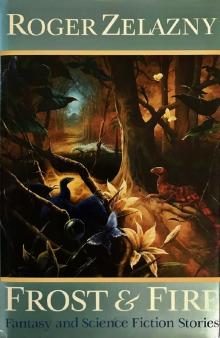 Frost and Fire
Frost and Fire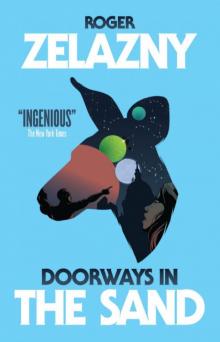 Doorways in the Sand
Doorways in the Sand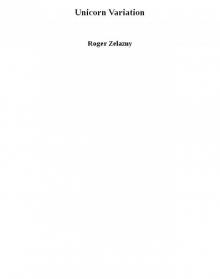 Unicorn Variation
Unicorn Variation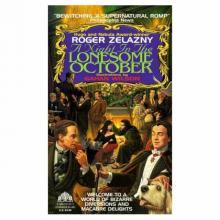 A Night in the Lonesome October
A Night in the Lonesome October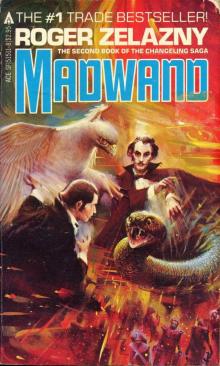 Madwand
Madwand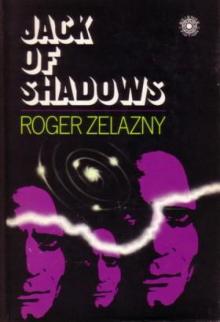 Jack Of Shadows
Jack Of Shadows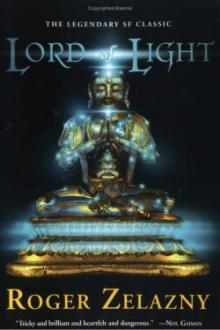 Lord of Light
Lord of Light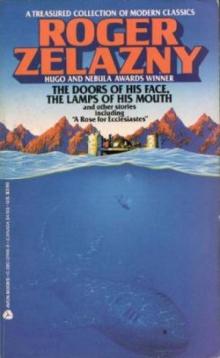 The Doors of His Face, The Lamps of His Mouth and Other Stories
The Doors of His Face, The Lamps of His Mouth and Other Stories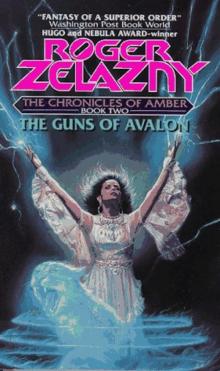 Guns Of Avalon tcoa-2
Guns Of Avalon tcoa-2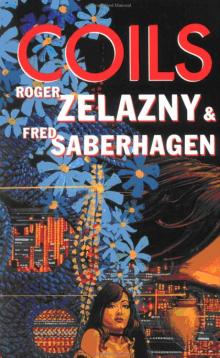 Coils
Coils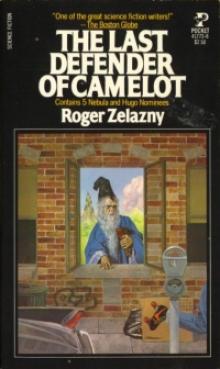 The Last Defender Of Camelot
The Last Defender Of Camelot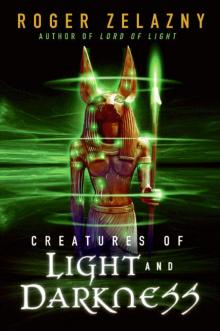 Creatures of Light and Darkness
Creatures of Light and Darkness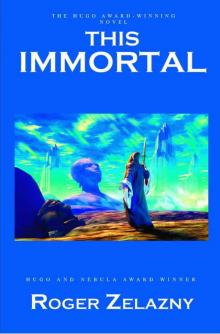 This Immortal
This Immortal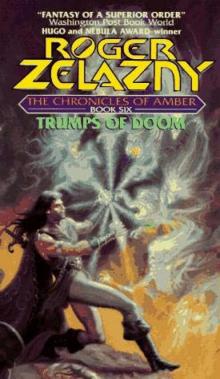 Trumps of doom tcoa-6
Trumps of doom tcoa-6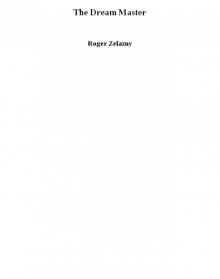 The Dream Master
The Dream Master The Complete Dilvish, The Damned
The Complete Dilvish, The Damned Nine Princes in Amber
Nine Princes in Amber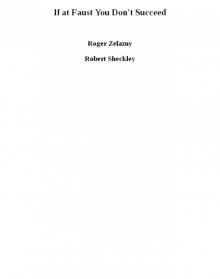 If at Faust You Don't Succeed
If at Faust You Don't Succeed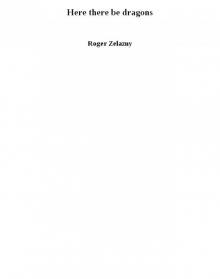 Here there be dragons
Here there be dragons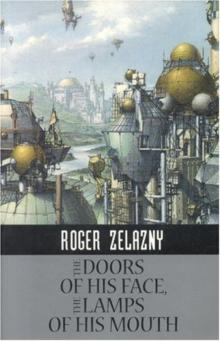 The Doors Of His Face, The Lamps Of His Mouth
The Doors Of His Face, The Lamps Of His Mouth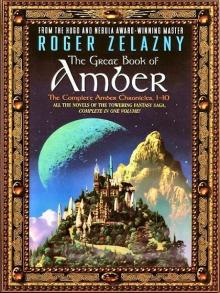 The Great Book of Amber - Chronicles 1-10
The Great Book of Amber - Chronicles 1-10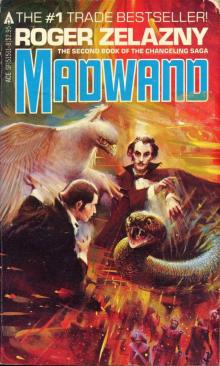 Madwand (Illustrated)
Madwand (Illustrated) The Chronicles of Amber
The Chronicles of Amber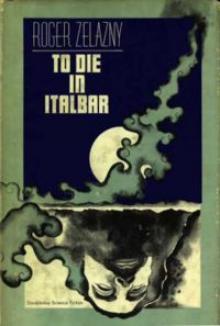 To Die In Italbar
To Die In Italbar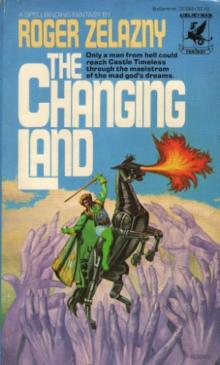 The Changing Land
The Changing Land The Furies
The Furies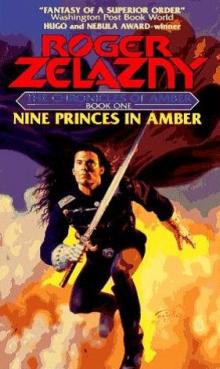 Nine Princes In Amber tcoa-1
Nine Princes In Amber tcoa-1 Last Of The Wild Ones
Last Of The Wild Ones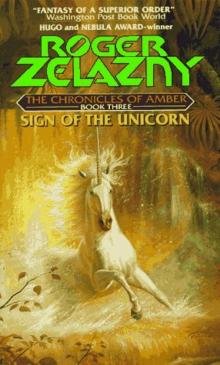 Sign of the Unicorn tcoa-3
Sign of the Unicorn tcoa-3 My Name is Legion
My Name is Legion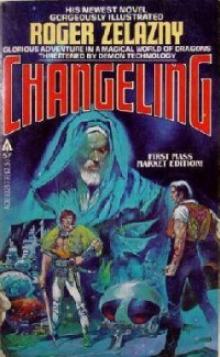 Wizard World 1: Changeling
Wizard World 1: Changeling Changeling
Changeling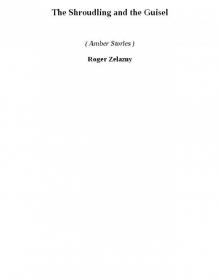 The Shroudling and the Guisel (amber stories)
The Shroudling and the Guisel (amber stories)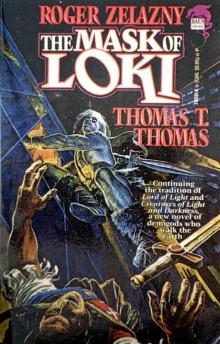 The Mask of Loki
The Mask of Loki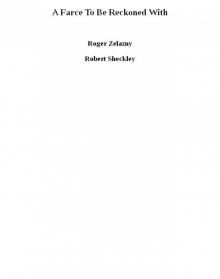 A Farce To Be Reckoned With
A Farce To Be Reckoned With Roadmarks
Roadmarks When Pussywillows Last in the Catyard Bloomed (rtf)
When Pussywillows Last in the Catyard Bloomed (rtf)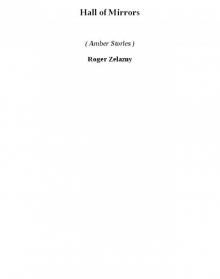 Hall of Mirrors (amber stories)
Hall of Mirrors (amber stories)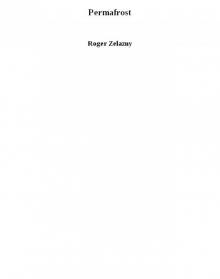 Permafrost
Permafrost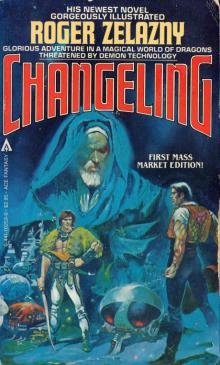 Changeling (Illustrated)
Changeling (Illustrated)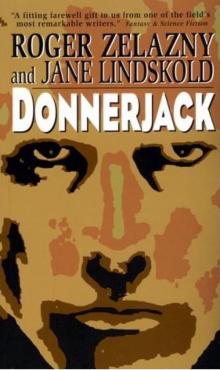 Donnerjack
Donnerjack Shadows & Reflections: A Roger Zelazny Tribute Anthology
Shadows & Reflections: A Roger Zelazny Tribute Anthology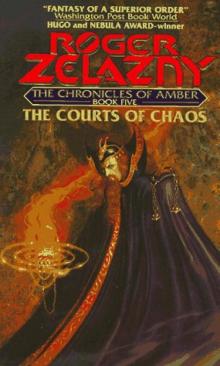 The Courts Of Chaos tcoa-5
The Courts Of Chaos tcoa-5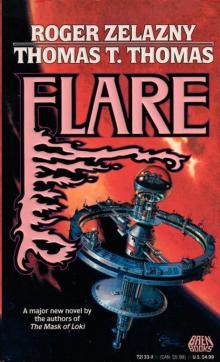 Flare
Flare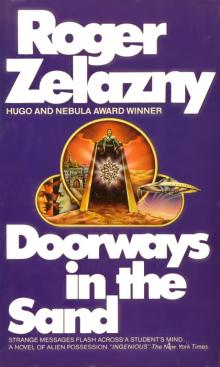 Doorsways in the Sand
Doorsways in the Sand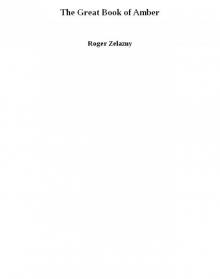 The Great Book of Amber
The Great Book of Amber Home Is the Hangman
Home Is the Hangman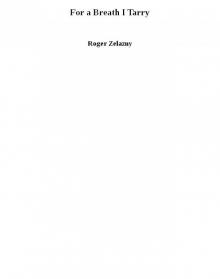 For a Breath I Tarry
For a Breath I Tarry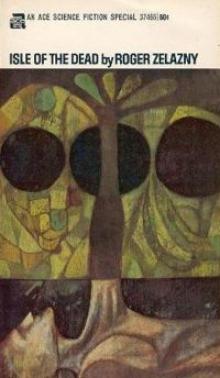 Isle Of The Dead
Isle Of The Dead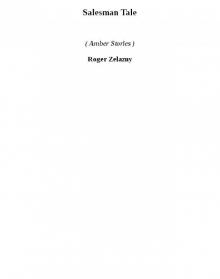 Salesman Tale (amber stories)
Salesman Tale (amber stories)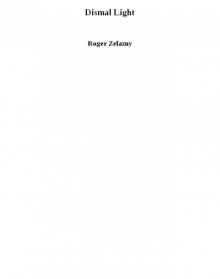 Dismal Light
Dismal Light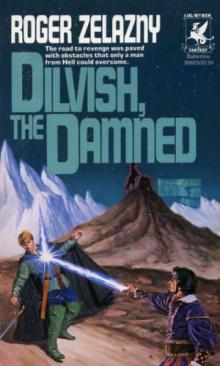 Dilvish, The Damned
Dilvish, The Damned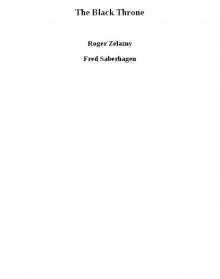 The Black Throne
The Black Throne Wizard World 2: Madwand
Wizard World 2: Madwand The Salesman's Tale
The Salesman's Tale